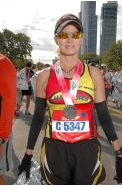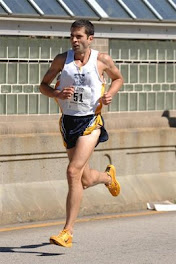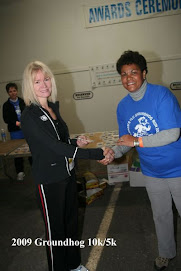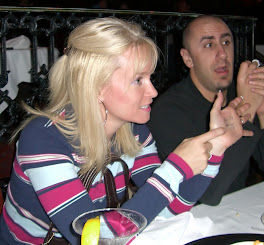I am not an elite runner. I will never be one. So, whatever the answer is, I'm not searching in the belief that it is a status attainable by me, but it is a status that I admire. In my mind, an elite runner is blessed with raw talent, and has finely tuned it by years of exhausting training and discipline. I view an "elite" runner as something of a hero, a role-model, someone who can inspire those of us who are weaker and less talented. And I love to hear about them and read about them, and absorb something from their lives.
I was gently reminded by my husband last night that running is my "latest little hobby." And I'm sure that many--if not most--people who view my running today probably see it that way. It is a humbling thought, and I am grateful to be reminded of it. Another perspective setter, lest I think too highly of myself: I did not take my first running step until 2005, and I had never run more than two miles until my first 5K in early October 2005. I am appropriately humbled as think through this topic.
As I started searching for the definition of an elite runner, I was blasted with many incompatible definitions. Answers.com probably gave the best, simplest definition of "elite" I could find: "The best or most skilled members of a group." But, being left brained and searching for something more measurable, I was hoping for a percentage. Something that would make this translation easier. Who can say if one is elite or not? Is it black and white, or is there some grey area?
I expanded my search into the realm of technology, and found what I was seeking. The top ten percent. I like that; it's simple. Could one say, the top ten percent of all U.S. runners can be considered "elite" in this country? How many runners are there? What is the spread of times? We could do something like take a large marathon with no barrier to entry, like Chicago or Marine Corps, and find out what is the cutoff for the top ten percent. For the latter, that puts the women's marathon time in about 3:57, and the male in about 3:34. Not far off from what was suggested on one forum that an elite marathoner as anyone who qualified for Boston. I think that's too big of a group--and doesn't take into account walkers, age groups, etc. Besides, I fully intend to run a sub-3:57 marathon someday, and I'm nothing special.
So, how about other ideas? I read: "Top 3 finishers in a race of 200 or more participants." That didn't work so much for me, because it depends on the race and who showed up that day. Some say, "If you've ever qualified for the Olympics, or gone to the Olympic trials." Well, I'd definitely agree-without knowing anything else, if you meet one of those two Olympic-based criteria, you are certainly an elite runner.
Then I ran across a site that listed times for males and females, by distance, what are considered elite times for high school runners: http://tn.milesplit.us/articles/7749. This site suggested 5K times as 22:00 for female and 18:00 for male, and marathon times of 3:20 for female and 2:50 for male. That seems sufficiently fast and unattainable to me. I found this measure the most appealing to my mathematical brain.
While not definitive, I did learn a lot about how people perceive elites. And there's probably some validity to all the measures I read about. There may be no "right" answer; maybe it's heart, maybe it's speed. Maybe it's just gutting it out when others give up for the long haul.
And therein lies the beauty of running. Anyone can be a winner! Anyone can improve on his or her best effort. All dreams--great and small--have meaning for the runner. Even me. My dreams are small in the "big fish, big pond" sense. And although I'll still never be an elite, I do have dreams that are meaningful and give me hope for the future. I, for one, hold my goals dear.
Lace 'Em Up For Boston!
10 years ago














_s_jpg.jpg)








No comments:
Post a Comment